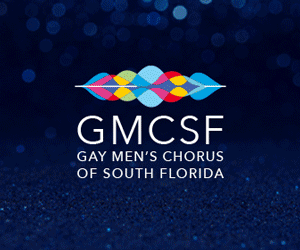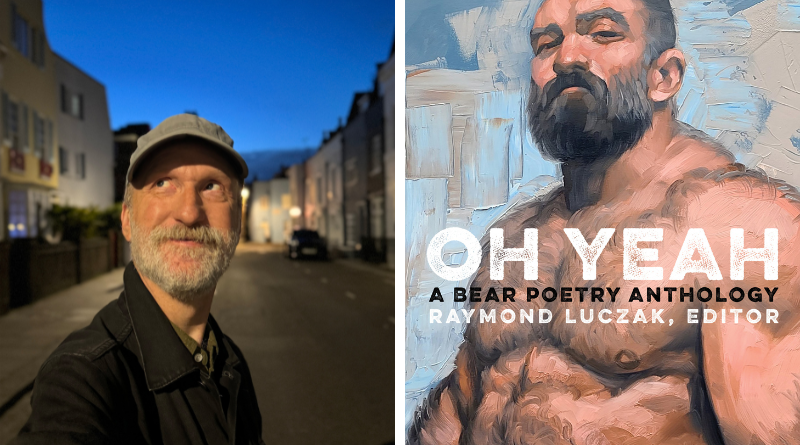
Raymond Luczak Curates a Wholistic Look at the Bear Experience with “Oh Yeah”
Raymond Luczak is an author, playwright, filmmaker, activist and bear. He is also the editor of a brand-new book entitled Oh Yeah: A Bear Poetry Anthology from Bearskin Lodge Press. Join us for a discussion about triumphs and shortcomings of the bear community and his experience as a deaf man in the bear scene.
Raymond Luczak is a unique and talented writer. Hailing from the small mining town of Ironwood, Michigan, Raymond lost much of his hearing at the age of eight months due to double pneumonia. Despite this he developed his talent for writing at an early age. After graduating from Gallaudet University, in Washington, D.C. he learned American Sign Language (ASL) and became involved with the deaf community. From there he won numerous scholarships in recognition of his talent, including the Ritz-Paris Hemingway Scholarship.
In 1988 he eventually moved to New York City where his play Snooty won first place in the New York Deaf Theater’s 1990 Samuel Edwards Deaf Playwrights Competition, and his essay “Notes of a Deaf Gay Writer” won acceptance as a cover story for Christopher Street magazine. Soon after, Alyson Publications asked him to edit Eyes of Desire: A Deaf Gay & Lesbian Reader and it’s been nonstop for him virtually ever since.
Over twenty of Luczak’s stage plays have been workshopped or produced in three countries. He directed the renowned ASL storyteller Manny Hernandez in Manny ASL: Stories in American Sign Language and his first feature Ghosted is currently in post-production. He has published novels including the bear themed Flannelwood in 2019 and Widower, 48, Seeks Husband in 2023 which although is not explicitly bear related, tackles many themes our community is familiar with. His newest project, Oh Yeah: A Bear Poetry Anthology was recently published this year and it sees his return to the role of editor.
Oh Yeah is a beautiful collection of poetry, curated by Luczak, which takes a look at the full range of the bear experience. It embraces our sexual freedom and celebrates our uniqueness while also shining a light on the issues of inclusivity and the body image problems that plague our community. The poems presented use vivid and descriptive language that tugs at the heartstrings (amongst other things) and creates a moving, enjoyable, and above all relatable read for all bears out there.
We sit down for an open and frank discussion with Raymond Luczak, a visionary and courageous artist who opens his heart and mind to us in the interview below.
(Be sure to read on after the interview for an exclusive look at three poems from Oh Yeah selected by Raymond himself.)
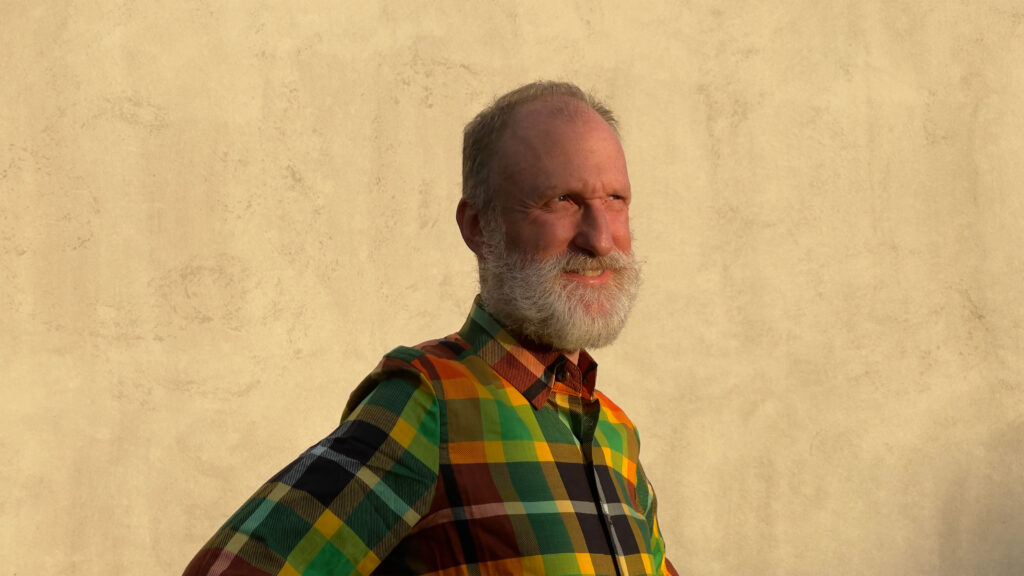
John Hernandez (JH): What made you want to put together this anthology of poetry specifically?
Raymond Luczak (RL): Simply put, there hasn’t been a lot of new queer-oriented poetry anthologies lately. I had been itching to do a bear poetry anthology partly because of the increased awareness of body positivity issues and the greater acceptance of using plus-sized models in fashion advertising. Anthologies often capture a particular moment in time that reflect how writers see themselves. A queer poetry anthology published 20 years ago would feel very foreign to us because the issues addressed back then may not be such a big deal now. Anthologies are often a historical (and social) record of sorts, so they can be incredibly affirming for those queer readers wondering if they had been alone with these thoughts, and insightful for generations yet to be born and hungering to understand what their queer ancestors had felt back then. History is far more important than we realize, particularly for those who did not grow up with a strong connection to their own biological families. We queer folks who have been excommunicated from our own kin must seek our own family histories elsewhere. Les K. Wright, the publisher of Bearskin Lodge Press and a huge advocate of sharing untold social histories, understood immediately why I had wanted to do this project.
JH: What were the determining factors for selecting the poems and poets that appear in this book?
RL: While I got a lot of amazing submissions, I knew the book had to fulfill the specific promise of its subtitle (A Bear Poetry Anthology). Thus I chose poems that explored in some meaningful way what it meant to be part (or not) of the Bear community, and that often meant tackling the occasionally icky feelings we have about our own bodies. After all, Bears are supposed to be stocky, hairy, and blue-collar, right? What about those guys who aren’t stocky, furry, and blue-collar (aka “masculine”)? How are they going to fit in that community with the bodies that they have? What’s so heartbreaking is that the Bear community were supposed to be all about body acceptance in the first place. Yes, it is there to a noticeable degree (thank God!), but it is of course never enough. And where is the sense of community that used to center around in-person events decades ago? Has it truly vanished in the wake of ubiquitous smartphones and “dating” apps?
In a way, I hope that Oh Yeah is an affirmation of community. The book is a prism of what it means to be loved as we are without those body-fascist police giving us dirty looks because we aren’t buff or handsome enough. We queer men need to stop projecting our own body hatred onto others that we consider unattractive and start loving ourselves as we are. We all deserve unconditional love and acceptance no matter how we may look. I do not understand why we’re not getting enough of that from one another, particularly when we’ve suffered so much from homophobia while growing up, but I suspect that our own internalized body shame is part of the problem.
JH: How did working on Oh Yeah compare to previous projects you have worked on?
RL: When I first approached Les about this project, I warned him that I didn’t have a lot of time in the spring of 2024, but if he was amenable to my having only one month for the reading period, I was game to put it together. The book came together very quickly. As it turned out, a lot of Bear poets had much to say, and they did say so quite pointedly and beautifully. They’re the ones who made me go, “Oh, yeah!”
Over the years I’ve edited a number of anthologies where the reading periods lasted much longer than a month. As much as I enjoyed working on all of them, the longer reading periods proved to be more of a drag. I couldn’t focus on my own books as much. Sometimes it felt as if so much of my life was put on hold.
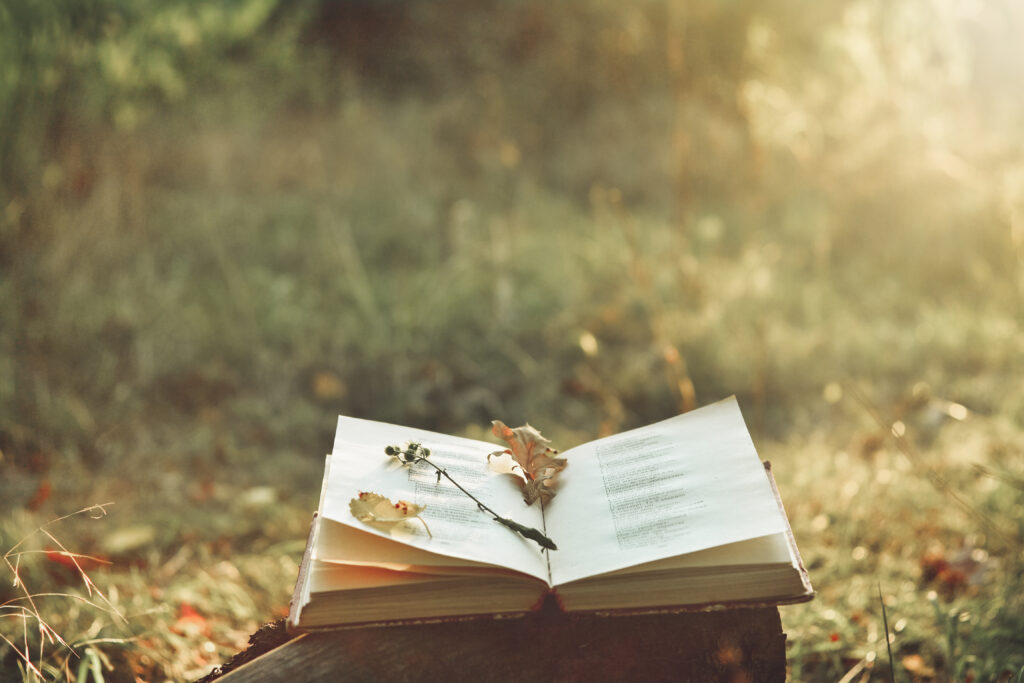
JH: As mentioned in the introduction of the book, many of the works are relatable to every bear on some level. What would you say are the universal themes bears encounter in their day to day lives?
RL: While I don’t feel comfortable with speaking for the Bear community as it has many subgroups, I have noticed that there seems to be a stronger sense of being silently policed by strangers on the street because of their bodies. And yet, ironically enough because there’s a much greater awareness of the Bear community unlike 30 years ago when I first noticed the BEAR Magazine, many guys coming out are learning much earlier that it is indeed okay to have the imperfect bodies that they have, and that they can be incredibly sexy to others. I think that’s a huge step forward for the younger generations who are worried about whether they’ll ever be attractive to anyone. That we have a strong swipe-left culture when it comes to those hookup apps isn’t helping anybody at all. We keep forgetting that we aren’t just pictures on a phone screen; we are human beings. We don’t see ourselves as disposable, so why are we still treating others as if they are? Come on, guys. We need to do better.
JH: The poets cover everything from nostalgia, to hooking up, living with disabilities, marriage—seemingly everything; but one common theme that seemed to come up over and over was the struggle many of us have with body image, as you have alluded to above. Can you speak to that? Was it purposefully included or something that seemed to keep creeping into the poetry naturally? Why do you think bears still struggle with body image in this age of body positivity?
RL: I think part of that came from my desire early on to choose only poems that touched on the Bear experience in some discernible way, so naturally some of the selected pieces touched on body image issues. It also makes sense because when non-Bears think of the Bear community, they automatically assume that all of us are on the plump side. We Bears already know that this is not true, that there is indeed a spectrum of all body types ranging from thin to overweight, which is absolutely wonderful.
As for those still struggling with body image issues today, we should blame advertising, particularly when they’re trying to sell us fashion or even the idea of a good time. The thing we must understand above all when it comes to advertising is that as long as they keep reminding us about our own insecurities (cosmetic, physical, or otherwise), they can continue to profit off our insecurities. Think about this: When was the last time we saw a group of heavy-set folks—instead of a group of HWP (height/ weight proportionate) folks—having a good time in a commercial? Such omissions simply signal to the Bear community (and others who are penalized for their own bodies) that they don’t deserve to partake in such communal happiness. Representation truly matters, and that’s why I’m very happy that periodicals like Bear World Magazine exist.
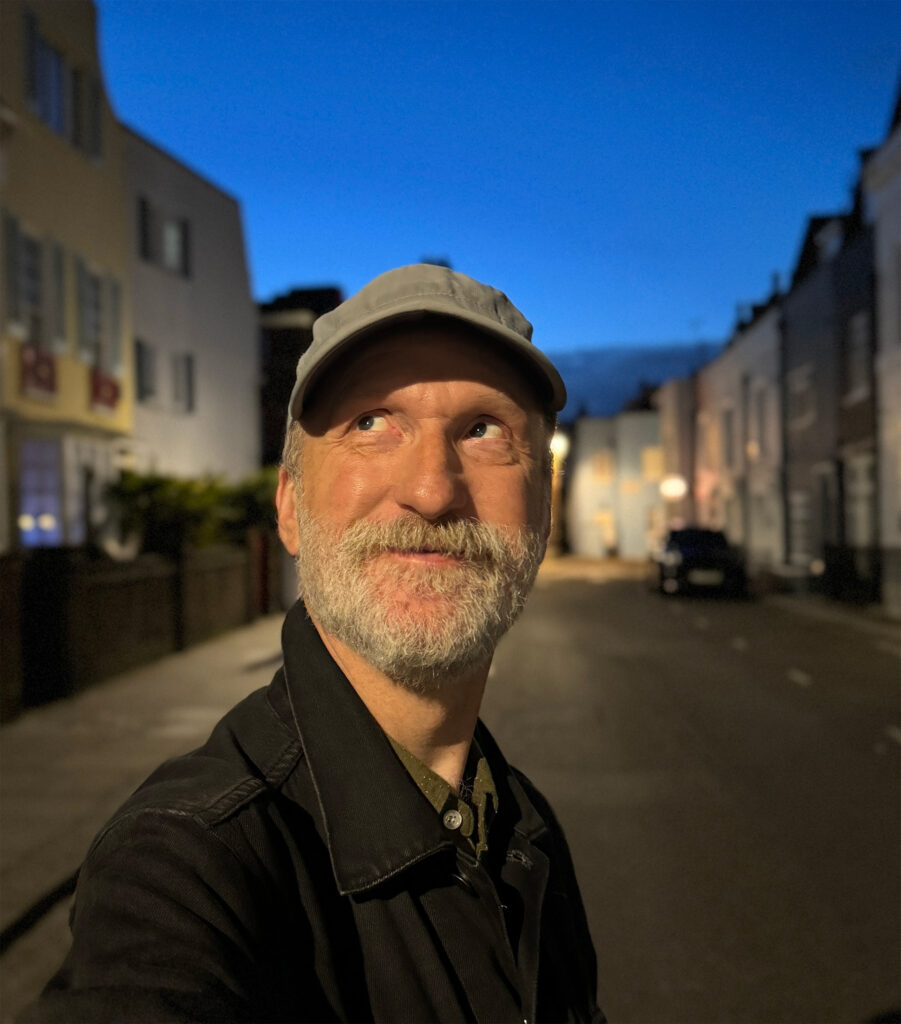
JH: Can you tell us what your experience has been in the bear community as a deaf man? And how has being deaf informed your art?
RL: To be frank, I have complicated feelings about the Bear community. I cannot tell you how many times stocky men have expressed disinterest in me because I am not stocky enough. (Never mind the fact that I have a healthy carpet of fur on my back, or that my full beard can grow quickly. Or was it actually because I am Deaf and have a nasal voice and wear hearing aids? Of course, they’d never dare admit to such ableism.) At times, the Bear community can strike me sometimes like my own hearing family; they’re too busy having a good time to notice that yeah, I may need them to slow down a bit and turn their faces in good lighting so I can lipread them especially if they don’t know how to sign. They don’t want to hear that it’s taken me 16 years of speech therapy to enable me to speak as well as I could with the kind of hearing loss I have. They don’t want to know that lipreading is a lot of work that succeeds solely on my knowing the context for each shift in topic during their banter. They don’t want to undergo the same amount of work in communication that I do. Keep in mind that I’m not bitter about the above descriptions; I’m simply stating the reality I’m given each time I attend any event filled with hearing people. At the same time, I’ve made good hearing friends in the Bear community who’ve readily accommodated my needs. If I’m too happy to repeat a word or two when a hearing person cannot understand my pronunciation, why can’t they if I can’t catch a particular word on their lips? They are the ones who truly understand that communication is a two-way street, and that clarity matters to everyone. They are the reasons why I still believe in the Bear community. Heck, the Bear community should be about the whole-person acceptance, not just the body acceptance.
Being Deaf has proven to be a blessing because it’s forced me to look outside the clichéd paradigm of speech in my own work. For any artist to grow and evolve, one must question societal assumptions and respond accordingly; at least that’s what I’ve strived to do when it comes to conveying my experiences in the hearing world. Speech isn’t everything; but true communication, which doesn’t rely on speech, is. Of course, queer readers of Bear World Magazine already know this core truth: Being gay (and Bearish!) has enabled us to look beyond the expected heteronormative aspects of society and discover people who live far more authentically, and with a lot more courage, than any straight person we might ever meet. They are the ones who continue to inspire.
JH: Your personal poems in the book seem to almost be written from the perspective of different characters. Is that accurate? Can you share your process for writing poetry?
RL: Because a number of my full-length poetry collections were already published, I knew there was only so much navel-gazing that any poet could get away with before boring his readers. Most of my books don’t necessarily focus on the Deaf gay experience, but lately I’ve been writing a bunch of poems about a variety of older gay men. I wanted to better understand what it means to age as a gay man, particularly since I’m middle-aged (how did that happen?), so it was essential to get inside the minds of certain characters and imagine their lives and emotions. In a way, these poems could be considered monologues; I’m a playwright, after all. For the anthology, I chose a few of my own that I felt would complement some of the topics raised by other poets. The best poetry anthologies often feel like a big conversation in which the poets (and their poems) are reacting to each other in often unintended and startling ways, and we readers are just listening and taking it all in. That was another aim of Oh Yeah: Can we have open and honest conversations about what it means to have the bodies that we have been given, and really listen to each other? For a community to thrive, we need to be willing to hear each other out. Too much loneliness comes from not being heard and seen enough.
As for writing poetry of my own, a lot depends on the variables. Sometimes a certain phrase can spark a poem; a certain image can provoke a long-forgotten memory. Sometimes I want to tell a story and the best form for that story happens to be poetry. That said, when I am feeling particularly inspired, I tend to write an entire collection over a month or so which I subsequently rewrite and reshape over the next few years. I do make a conscious effort to differentiate each of my books from one another, though. As an artist, I find the act of changing gears and playing within limitations to be vital to my insatiable need for discovery: What will I discover today in that blank sheet on my computer screen? I like surprising myself. My feeling is that if I am unexpectedly surprised by what I’ve written, my own readers may be as surprised too.
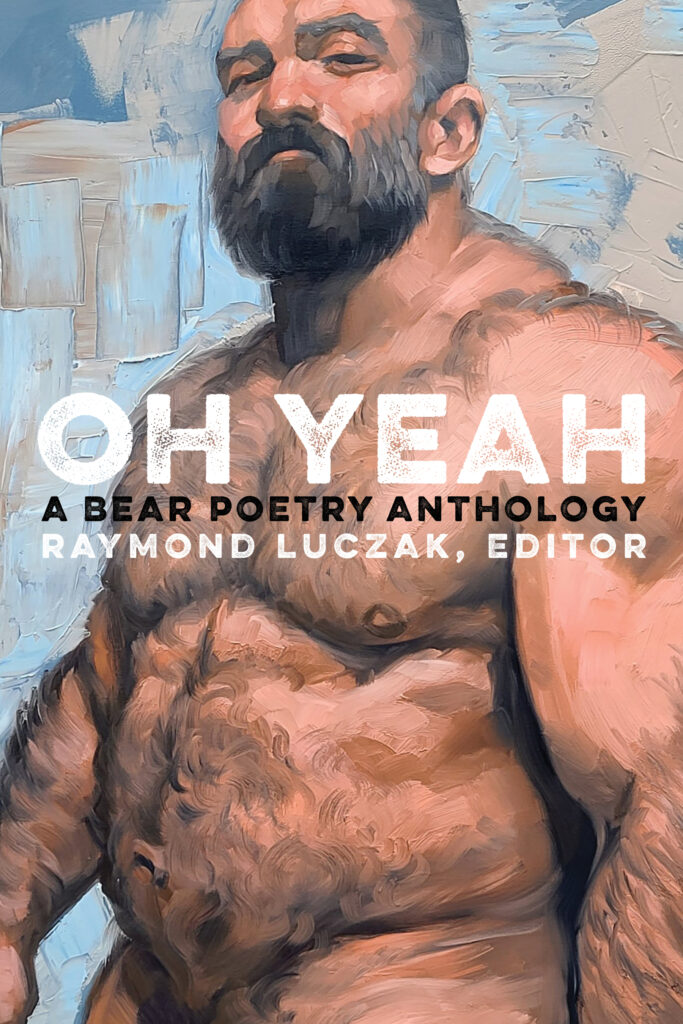
Selections from Oh Yeah: A Bear Poetry Anthology
Bear Ghazal
By Alex Carrigan
I exited a cave and was finally ready to declare myself a bear, but the
question remains to figure out how to reveal to the world that I’m a bear.
Will I buy a motorcycle and a leather jacket, showing my bare chest
as I ride down the beltway, showing that I’m a “live fast, die young” bear?
Will I stand in front of my bathroom mirror, contorting my hands
to get the best post-shower selfie, showing that I’m a “thirst trap” bear?
Will I powder my hands as I grip free weights and go for several
more reps, showing that I’m a “sweaty, but glistening” bear?
Will I carefully manage my body hair to ensure it lays across my
pecs, that my beard isn’t too uneven, showing I’m a “Brawny Man” bear?
Will I be any of these bears, despite the fact I’m fearful of motorcycles,
hate social media, don’t work out, and am quite an unkempt bear?
Perhaps I’ll go back into that cave and give myself a few more seasons of
hibernation before I come back out and once again declare myself a bear.
Perhaps before I do, I’ll gather as much bear literature as I can
for late night studying and next year I’ll emerge as an assured bear.
Mr. Masculine
By Shane Allison
Mr. Masculine.
Mr. Kink.
Mr. Mentor Daddy.
Mr. Bear Top.
Mr. Man of Condoms.
Mr. No Strings Attached.
Mr. Pup Handler.
Mr. Friend with Benefits.
Mr. Smooth.
Mr. Hairy.
Mr. I Thought I Would Give This a Try.
Mr. Toxic Masculinity.
Mr. Undetectable.
Mr. Introverted.
Mr. Significant Other.
Mr. I Prefer Younger Guys, but It’s Not Written in Stone.
Mr. I Prefer European Men.
Mr. BBC.
Mr. Pudgy.
Mr. Easy Going.
Mr. Semi Chub.
Mr. Let’s Go Private.
Mr. Do You Cam?
Mr. No Disrespect, but I’m Looking for No One Old Enough to Be My Dad.
Mr. I Love Everybody.
Mr. Primal.
Mr. Chubby Chaser.
Mr. Unlock for Me, I’ll Unlock for You.
Mr. I’m Just an Average Guy.
Mr. Rope Bunny.
Mr. Master.
Mr. Sadist.
Mr. Two-Day Load.
Mr. I’m About to Explode.
Muscle Bear
By Gary Garafola
Once your skin gave way like floury dough and we couldn’t have THAT,
The teasing in the hallways seared you, burned your forehead,
Gym class left you like the cheese, standing alone unpicked
But oh how you fought back, hours at the gym, days, years
Until you shone like burnished gold but hard as steel
Now you are the one who stands in judgment at the bar,
Such a big man laughing at the weaker specimens
The men you deem imperfect, clumsy,
Leaving them off your team of similar simians,
Taunts which scar and shoulders that freeze and close out,
At last you became the bully who hurt you
Find out more about Raymond Luczak on his website and get your copy of Oh Yeah: A Bear Poetry Anthology HERE.







